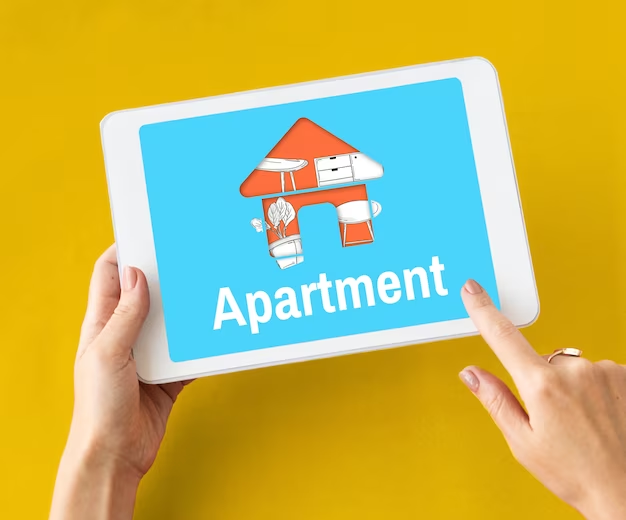Moving into a new apartment is an exciting chapter in anyone’s life. But before you start planning where to put your couch or what color to paint the walls, there’s one crucial question you need to answer: how long do apartment applications take? This question is vital for anyone eager to settle into their new home. This article will explore the apartment application process, shedding light on the typical timeline and what factors can speed up or slow down the process.
Understanding the Apartment Application Process

Before diving into how long apartment applications take, it’s essential to understand the steps involved. Typically, the process includes the following stages:
- Searching for an Apartment: The initial step involves finding an apartment that meets your needs.
- Submitting an Application: Once you’ve found a suitable apartment, the next step is to submit an application. This usually involves providing personal and financial information.
- Background and Credit Checks: The landlord or property management company will conduct background and credit checks to assess your suitability as a tenant.
- Approval or Rejection: Based on the checks, you’ll either be approved or rejected for the apartment.
- Signing the Lease and Moving In: If approved, the final steps are signing the lease and planning your move.
Factors Influencing Application Processing Time
Several factors can affect how long apartment applications take. Understanding these can help set realistic expectations for the timeline.
Landlord or Property Management Efficiency
One of the most crucial factors affecting the processing time of apartment applications is the efficiency of the landlord or property management company. This efficiency can significantly impact the speed at which your application is reviewed and approved. Some landlords and management companies are known for their quick response times, often able to process applications within just a couple of days. On the flip side, others may have slower processes, especially if they manage multiple properties or have a more thorough vetting process in place.
- Quick Responders: Certain landlords or management companies are renowned for their efficiency, thanks to well-established procedures and resources.
- Slower Processes: Landlords handling multiple properties or implementing comprehensive tenant screening may take longer to approve applications.
Applicant’s Readiness
Applicants also play a significant role in determining the processing time of their apartment application. Being well-prepared and responsive can significantly expedite the process. To ensure a smoother process, it’s crucial to have all the necessary documentation readily available, including photo identification, proof of income, rental history, references, and the required fee. Additionally, once you’ve submitted your application, promptly responding to any requests for additional information or clarification can help avoid unnecessary delays.
- Documentation: Essential documents include photo ID, proof of income, rental history, references, and the application fee.
- Response Time: Timely responses to requests for additional information are essential for a swift process.
Time of Year
The timing of when you submit your apartment application can also significantly impact processing times. Different seasons bring varying levels of demand for rental properties, which can affect how quickly your application is reviewed and approved. During peak moving seasons, such as summer, the demand for apartments is higher, often resulting in longer processing times as landlords and management companies handle a higher volume of applications. Conversely, the off-season, usually during the winter months, may offer quicker processing due to lower demand, allowing for more prompt review and approval.
- Peak Moving Seasons: Times like summer are characterized by high demand, potentially leading to longer processing times.
- Off-Season: Winter months may offer quicker processing due to lower demand for rental properties.
Typical Timelines for Apartment Applications

So, how long do apartment applications take on average? While it varies, here’s a general breakdown:
Fast Track: 24-48 Hours
In some fortunate cases, apartment applicants experience a swift and efficient process, taking as little as 24-48 hours from submission to approval. This “fast track” scenario typically occurs when all parties involved, including landlords and applicants, are well-prepared and responsive. Below, we provide a breakdown of the key factors contributing to this speedy approval:
| Factor | Description |
| Prepared Applicant | Applicants who have all required documents and references readily available can expedite the process. |
| Efficient Landlord | A landlord who promptly reviews applications and conducts background checks contributes to the speed of approval. |
| Low Demand | During less competitive rental periods, landlords may have fewer applications to review, expediting the process. |
In such cases, applicants can expect to receive a positive response within the first two days, enabling them to secure their desired apartment quickly.
Average Time: 3-7 Days
For most apartment applicants, the journey falls into the category of an average processing time, typically taking about 3-7 days. During this period, landlords carefully review applications, conduct background checks, and assess the suitability of potential tenants. The following factors play a role in determining the duration of this process:
| Factor | Description |
| Volume of Applications | A higher number of applicants may lead to a longer processing time as landlords need to review each application thoroughly. |
| Background Checks | The time required for conducting comprehensive background checks on applicants can extend the processing period. |
| Landlord’s Availability | The availability of the landlord for interviews and property viewings can impact the speed of processing. |
Typically, applicants who fall into this category can expect to receive a response from the landlord within a week, allowing them to plan accordingly for their potential move.
Extended Scenarios: Up to Two Weeks
In more complex scenarios, such as when additional checks are needed or during peak rental seasons, the apartment application process can extend to up to two weeks. It’s crucial to understand that various factors contribute to this extended timeframe:
| Factor | Description |
| Peak Rental Seasons | During high-demand periods, landlords may receive numerous applications, leading to longer processing times. |
| Additional Checks | Certain landlords may require extra checks, such as credit history or income verification, which can add time to the process. |
| Multiple Applicants | If multiple individuals apply for the same apartment, the landlord may need additional time to compare and evaluate each application. |
Applicants in extended scenarios should exercise patience and plan for a potentially longer wait before receiving a decision.
How to Speed Up Your Apartment Application
To ensure your application is processed as quickly as possible, consider the following tips:
Complete Application Thoroughly
One of the fundamental steps in expediting your apartment application process is to ensure that your application is complete in all aspects. Landlords appreciate applicants who pay attention to detail and provide all necessary information. Here’s a checklist to help you complete your application thoroughly:
- Fill out every section of the application form.
- Double-check for any missing information or unanswered questions.
- Provide accurate contact details, including phone numbers and email addresses.
- Include complete rental history, specifying dates and landlord contacts.
- List all occupants who will be residing in the apartment.
By submitting a comprehensive and error-free application, you demonstrate your seriousness as a potential tenant and make the landlord’s job easier.
Gather Necessary Documents in Advance
Having all the required documents readily available can significantly expedite the application process. Landlords typically request documents such as proof of income, identification, and references. Prepare a document folder with the following essential paperwork:
- Proof of Income: Recent pay stubs, employment verification letter, or tax returns.
- Identification: Valid government-issued ID, driver’s license, or passport.
- References: Contact information for previous landlords or rental references.
- Credit Report: Obtain a copy of your credit report to provide if requested.
By proactively gathering these documents, you can respond swiftly to any document requests, demonstrating your organization and preparedness.
Respond Promptly to Requests
When the landlord or management company contacts you for additional information or clarification, it is crucial to respond promptly. Delayed responses can lead to delays in processing your application, and landlords may move on to other applicants if they perceive a lack of interest or commitment. Here are some tips for prompt responses:
- Keep your phone and email notifications active to catch communication from the landlord quickly.
- Set aside time each day to check and respond to messages related to your application.
- Acknowledge receipt of any messages promptly, even if you need more time to
provide the requested information.
Demonstrating your responsiveness and cooperation can leave a positive impression on the landlord, potentially expediting the approval process.
Don’t Hesitate to Follow Up
If you haven’t received a response from the landlord within a reasonable time frame, it’s entirely appropriate to follow up politely. Sometimes, application processes can become delayed due to various reasons, and a gentle nudge can help keep your application on their radar. Here’s how to follow up effectively:
- Wait at least 3-5 business days after your initial submission before following up.
- Use polite and professional language in your follow-up email or call.
- Express your continued interest in the apartment and inquire about the status of your application.
Following up demonstrates your enthusiasm for the apartment and ensures that your application doesn’t get lost in the shuffle.
Common Misconceptions About Apartment Application Timelines
Misconception 1: “Weekends Don’t Count”
It’s a common belief that weekends are non-working days for landlords, leading applicants to think that their application process will be delayed if they submit their paperwork on a Friday or over the weekend. However, this is not entirely accurate. Landlords and property management companies often work on weekends, especially in high-demand rental markets. Here’s a breakdown of how weekends are typically considered in the apartment application timeline:
- Application Submission: Most landlords and property management offices accept online applications 24/7. This means you can submit your application over the weekend without delay.
- Processing: While some administrative tasks might be delayed until Monday, many aspects of application processing, such as initial document reviews, can start as soon as your application is received.
- Communication: Landlords may contact applicants and schedule showings or interviews on weekends if necessary.
While there might be a slight delay in some administrative tasks, weekends generally do count in the apartment application timeline, and you should not hesitate to submit your application during weekends if it suits your schedule.
Misconception 2: “Credit Checks Take Weeks”
Another common misconception is that credit checks take an extended period, causing applicants to worry about the status of their application. In reality, the process of conducting a credit check is typically much quicker than many assume. Here’s a detailed breakdown of the credit check timeline:
- Credit Report Request: Landlords or property management companies can usually request credit reports from credit bureaus electronically, which can be done within minutes.
- Credit Report Delivery: Credit reports are often delivered to the landlord or property manager within a few hours to a day, depending on the credit bureau’s response time.
- Review and Decision: Once the credit report is received, landlords can review it and make a decision relatively quickly, often within a day or two.
In most cases, credit checks do not take weeks to complete. They are a relatively fast part of the application process and are unlikely to cause significant delays.
Misconception 3: “You Need a Perfect Credit Score”
Applicants often believe that they must have a flawless credit score to secure an apartment. While a good credit score is indeed an advantage, it’s important to understand that landlords consider multiple factors when evaluating applications. Here’s a breakdown of the various elements that landlords may assess:
- Credit Score: Landlords may have a minimum credit score requirement, but it doesn’t necessarily need to be perfect. A “good” credit score, typically in the range of 650 to 700 or higher, is often sufficient.
- Income Verification: Landlords may require proof of sufficient income to ensure that you can afford the rent. Typically, your monthly income should be at least three times the monthly rent.
- Rental History: Positive rental history, including references from previous landlords, can carry significant weight in the application process.
- Criminal Background: Some landlords may conduct criminal background checks to ensure the safety of their property and other tenants.
While a good credit score can improve your chances, it’s not the sole determinant of your eligibility for an apartment. Landlords consider a combination of factors, and applicants with a less-than-perfect credit score can still secure a lease by demonstrating financial stability, a positive rental history, and meeting other requirements.
Conclusion
How long apartment applications take can vary widely based on several factors. The key to a smoother and quicker process lies in being prepared, responsive, and understanding that each landlord’s process may differ. By managing your expectations and preparing adequately, you’ll be unlocking the door to your new apartment before you know it!
FAQ
Q1: Can a landlord take too long to respond to my application?
A1: Legally, there’s no set time frame for a response. However, if it’s taking unusually long, it’s reasonable to ask for an update or consider other options.
Q2: Does applying for multiple apartments at once speed up the process?
A2: Not necessarily. It’s more about finding efficient landlords and being prepared yourself.
Q3: If I’m rejected, will it take longer to apply elsewhere?
A3: Not if you have your documents and information ready to go. Each landlord operates independently.
Q4: Are online applications processed faster?
A4: Often, yes. Online applications can be more efficient and quicker for landlords to review.
Q5: Does having a co-signer affect the application time?
A5: It can, as the co-signer’s information will also need to be verified. However, this doesn’t usually add significant time.



